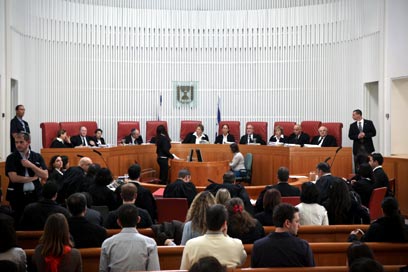
High Court hears citizenship law petition
State says 81 Palestinians with direct ties to suicide attacks sought Israeli citizenship
No less than 11 Supreme Court justices sat Tuesday in a rare hearing in the court's main chamber. They discussed petitions to the High Court to nullify a law that prevents Palestinians married to Arab Israelis from gaining legal status in Israel.
At the beginning of the discussion the prosecution's counsel, Attorny Yochi Gensin, presented figures from 2007 showing that 632 Palestinians who received initial permits to unite with their Israeli partners were tied to terrorism. Out of these, 273 had direct ties to terror.

Tuesday's High Court hearing (Photo: Noam Moscowitz)
Notably, in most of these cases the attacks did not materialize as the Shin Bet was able to thwart them.
At the time of the ruling, handed down by the High Court more than three years ago, 27 Palestinians who were in the midst of the family reunification process had direct ties to suicide attacks, a state representative said. Some 155 Israelis were killed in these attacks.
Another 54 Palestinians with connections to suicide attacks have since the ruling submitted requests to receive Israeli citizenship.
Attorney Gensin said that ever since the said ruling, some 1,000 family reunification requests are received a year. If the law had not been passed, the numbers would reach 3,000 applications a year with 600 of them for people with direct ties to terrorism, he said.
After the prosecution presented the figures on terrorist attacks in 2006, Supreme Court President Dorit Beinish asked the prosecution: "This shows that the Shin Bet is worthy of high esteem for its ability to thwart (terrorist attacks). However, how is this relevant to the discussion?"
Justice Asher Grunis also had difficulty with the same issue: "You need to provide examples of the actual utilization of a person with Israeli residency, not potential."
'Anti-democratic law'
Following the statements made by the prosecution, Attorney Dafna Holz-Lechner, representing one of the petitioners, former MK Zahava Gal-On, claimed that the law is mere window dressing since, according to her, nothing is more permanent than the so-called temporary provision.
Attorney Sawsan Zaher, representing the Adalah Legal Center for Arab Minority Legal Rights in Israel, said that there is no other country in the world with such "anti-democratic" law. To this, Justice Elyakim Rubinstein responded: "There is no other country in the world in a security situation such as ours." Chief Justice Beinish added: "We have a unique reality."
Following the discussion, Gal-On said to Ynet: "The State again is trying to instill fear in the court, and is providing unclear and irrelevant statistics. I, too, am afraid of terrorism, but the State needs to create balances."
A representative from the Association for Civil Rights in Israel, which also petitioned the High Court's ruling, Attorney Oded Feller, said: "The State Prosecutor's Office has been having this tongue-in-cheek discussion for years as it relates stories about national security and even provides figures that no one is capable of checking. A democratic country takes risks. If we let a person live with his family, it will be possible to examine each one individually."










